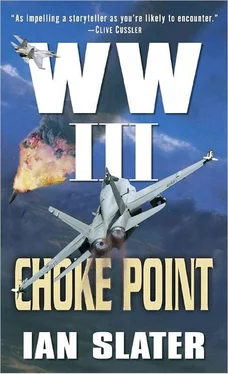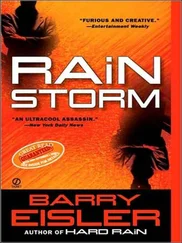“Seals,” said Salvini.
For a moment the general, tired, thought he meant “SEALs.”
“That so?” said Aussie doubtfully.
“Yeah,” said Salvini confidently, looking about the motel room for something to drink. “Surprised you haven’t got more of ’em on that trace.”
“Seals?” said Freeman, whose vanity habitually denied he was surprised by anything.
“Yeah,” repeated Salvini, his hands flapping in a bad imitation of the sea mammal. “You know, Flipper? Caves must be full of ’em.”
Seldom had Sal, Choir, Aussie, or David seen Freeman so taken by surprise.
“Sea caves are full of ’em,” continued Salvini. “That’s why the IR hot spots you’re seeing are so big.”
“Well,” Freeman began, “that’s no damn good! I figured on having you guys swim in and check out anything that might be the size of midget sub, but dammit — we haven’t enough people to investigate every damn cave up and down the coast.” He paused, fixing an anxious brow on Salvini. “How in God’s name do you know this, Sal? Seals? You’re from Brooklyn, for God’s sake.”
“The zoo,” said Sal. “Not seals but sea otters. Used to take my sister’s kids in the evening. Took my squad IR goggles for fun so the kids could see the critters all nestled up in their lairs. Big white blobs just like on your IR feed right there. They huddle together.”
“Aw,” said Aussie, “you don’t know dick! Could be anything in those sea caves.”
“Yeah,” conceded Sal nonchalantly. “But if you look at the feed’s scale—” He leaned closer. “—two inches to the mile. It’s got to be some pretty big mammals.” He paused, joshing Aussie, “Maybe they’re elephants!”
“Oh, very droll, Sal,” said Aussie. “Ha! Ha!”
“Wait a minute,” interjected David. “Sal could be right, General. The midget sub could be using a seal colony as infrared cover.”
Choir good-naturedly dismissed the idea of the enemy, whoever they were, using the collective heat signature of mammals as IR cover.
“And what d’you know about mammals, Choir?” challenged Aussie. “ ’Cept for those Welsh tarts you used to bed.”
“I’ll ignore your antipodean vulgarity.”
“Antipodean. I’m an American citizen, you Welsh turd!”
Freeman, ignoring Aussie’s joshing, pressed Choir for his explanation of why terrorists wouldn’t use such a cave.
“Noise,” answered Choir. “Ever hear the racket those creatures make? It’s worse than Aussie’s snoring.”
“So,” proffered the general, “what we need to look at are the caves without a hot spot. A cold cave’s where the sub’s mother ship, its milch cow — a trawler, whatever — stashes its food, torpedoes, mines, diesel fuel. An otherwise empty cave. Sub comes in literally ’when the coast is clear.’ Surfaces inside the sea cave, resupplies quickly, and heads back out.”
“Maybe,” suggested David, “that’s why the Navy hasn’t seen any signs of the midget surfacing for air replenishment.”
“Darkstar saw it,” Freeman corrected him. “That’s why Jensen dispatched that RIB with those divers Albinski and—” He thought for a moment. “—Dixon.” He sighed in exasperation. That General Blackmore had been right when he told the West Point graduates that nowadays you’d have to be part detective to be a good soldier.
Freeman played back the stored IR feed, looking now for cold caves, those whose residual daytime-stored heat signatures were so slight he’d passed them over. It was a dispiriting exercise. The cold cave count rose to 278, and Darkstar hadn’t yet reached the big Father and Son sea stacks south of Cape Flattery. Would the Navy have enough time to search them all before the sub attacked again? Or was Larry King’s suggestion accurate, that perhaps the terrorists’ sub had had its fill of death and destruction now that the decimated battle group had retreated.
“Cold caves, gentlemen,” he said, “with an anomaly near them. That’s what we’re looking for.”
In the Hindu Kush, more fighting had broken out as a resurgent Taliban battalion, financed out of Pakistan, was infiltrating back into Afghanistan to destabilize the nascent U.N.-protected government in Kabul, which in fact was mainly a U.S. operation. The Taliban leaders’ timing was brilliant — to strike when the U.S. Homeland Defense was consumed by a massive public panic attack even greater than that of 9/11. If the terrorists, or whoever, could easily attack America’s guardians, who could guard the guardians? The one qualified hope, media pundits such as CNN’s Marte Price were saying, was that “as terrible as the attack on our Navy is, it’s so far been confined to military targets and not defenseless citizens.”
“Silly woman!” opined Freeman, one ear listening to CNN, the other to the suggestions of his four SpecFor warriors brainstorming about how to narrow the search for where the sub might be hiding. “Marte should know better than that. Some poor son of a bitch civilian’s probably dead already, caught in that rain of shrapnel when the Aegis blew up.”
The general was right and wrong. A civilian night watchman, Carlito Vincennes of Cherry Point, had died three and a half minutes after he’d seen a light, which he thought was either out in the strait or in the woods across the bay. It had looked to him like a camera flash. Then he saw that it was a narrower beam of white light. A missile coming straight for him. “Incoming!” he screamed into his walkie-talkie. “Twelve o’clock low!”
The ensuing line of explosions that engulfed the Cherry Point refinery, as row upon row of storage tanks blew, killed Carlito and twenty-three other civilian nightshift workers. It also produced an enormous firestorm on land, the burning oil disgorged from the destroyed storage tanks flowing into the sea and forming a ten to fifteen acre firespill whose black columns of choking smoke and flames did a macabre dance hundreds of feet into the air. The heat was so intense that surrounding forests and bitumen roads caught fire as if by spontaneous combustion, trapping hundreds of families in the long lines of refugee vehicles already fleeing the rumored danger of radiation leakage from the sunken Aegis carrier and the Utah .
But where had the missile come from? “Incoming twelve o’clock low” had confounded Cherry Point’s head of security. As a reserve member of the Washington State National Guard, he’d understood “twelve o’clock” meant something had been coming head-on at Vincennes. But from which direction, land or sea? In short, what direction had Vincennes been facing? Sea or land?
It was only later, after 120 square miles of prime Northwest trees had been destroyed by the fire and the town of Birch Bay, near Cherry Point, was a charred, smoking ruin, that the already overstretched Coast Guard was able to triangulate the vectors from various reports about a “flash of light.” They deduced that the missile had been fired from the sea. So much for the midget having had its fill. It was, in fact, even more audacious. The reports of two trawlers — one Canadian and the other American — estimated that the “shoot and scoot” firing of the skimmer had probably taken no more than four minutes, including a possible crash dive.
Freeman at least now felt confident that the midget sub’s pen probably lay somewhere between Port Angeles and Cape Flattery.
Aussie Lewis, Brentwood, and Salvini agreed with the general’s hypothesis, which revolved around the simple but unchanging requirement in war that the closer you were to your supplies, the better.
“No Wal-Marts south of Flattery?” said Choir in his lilting Welsh accent.
Читать дальше












